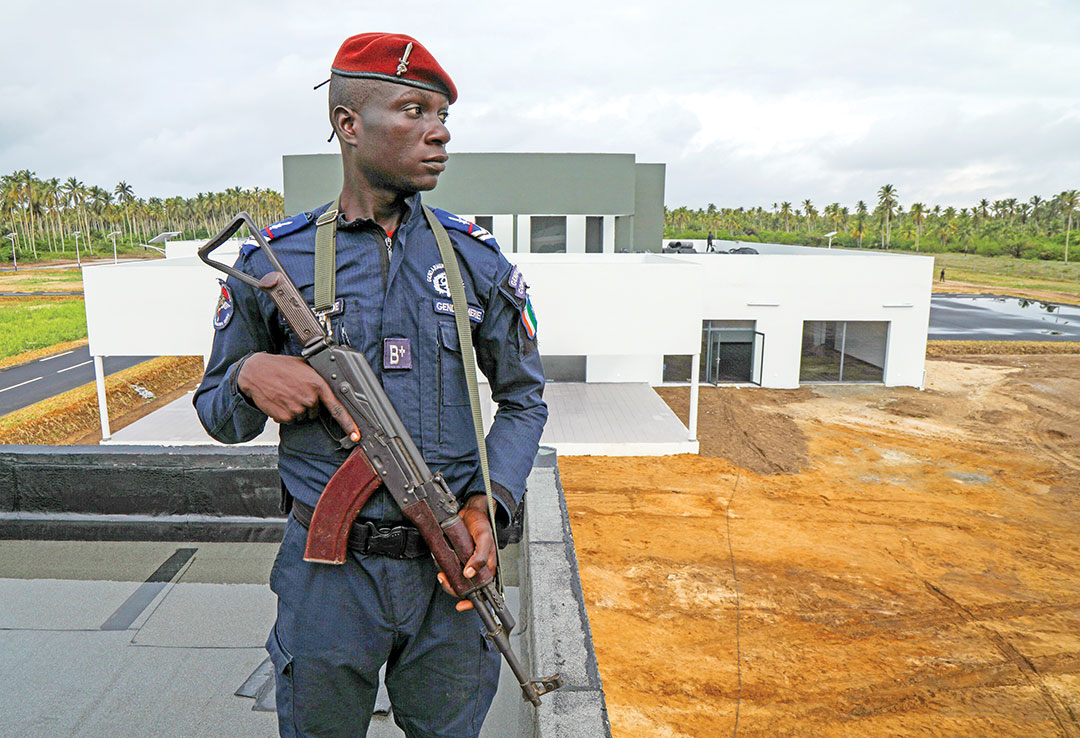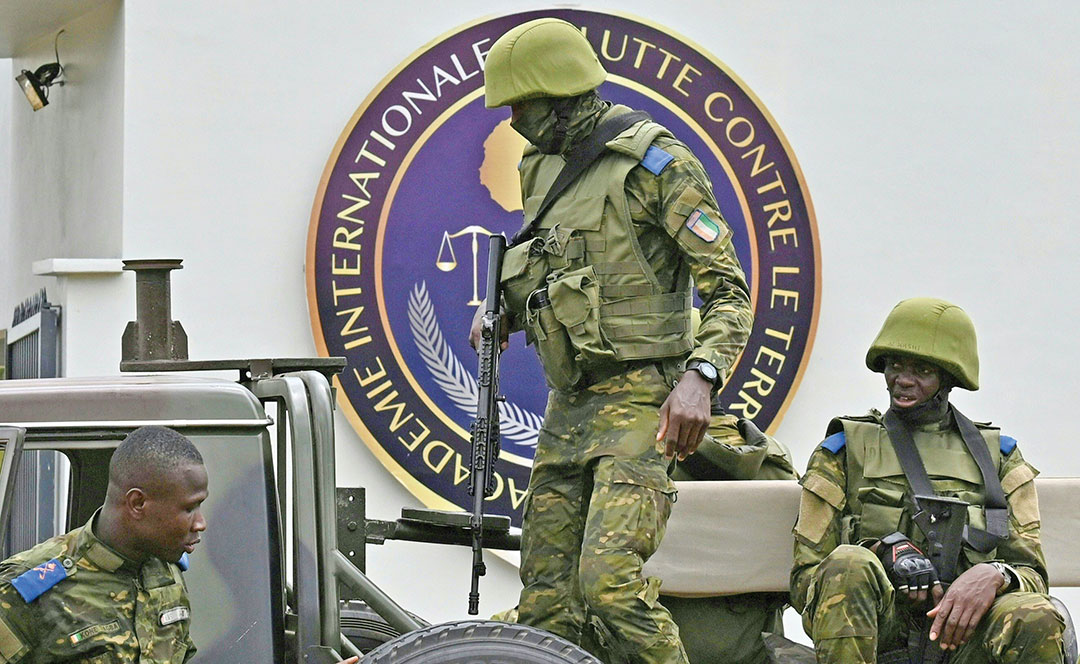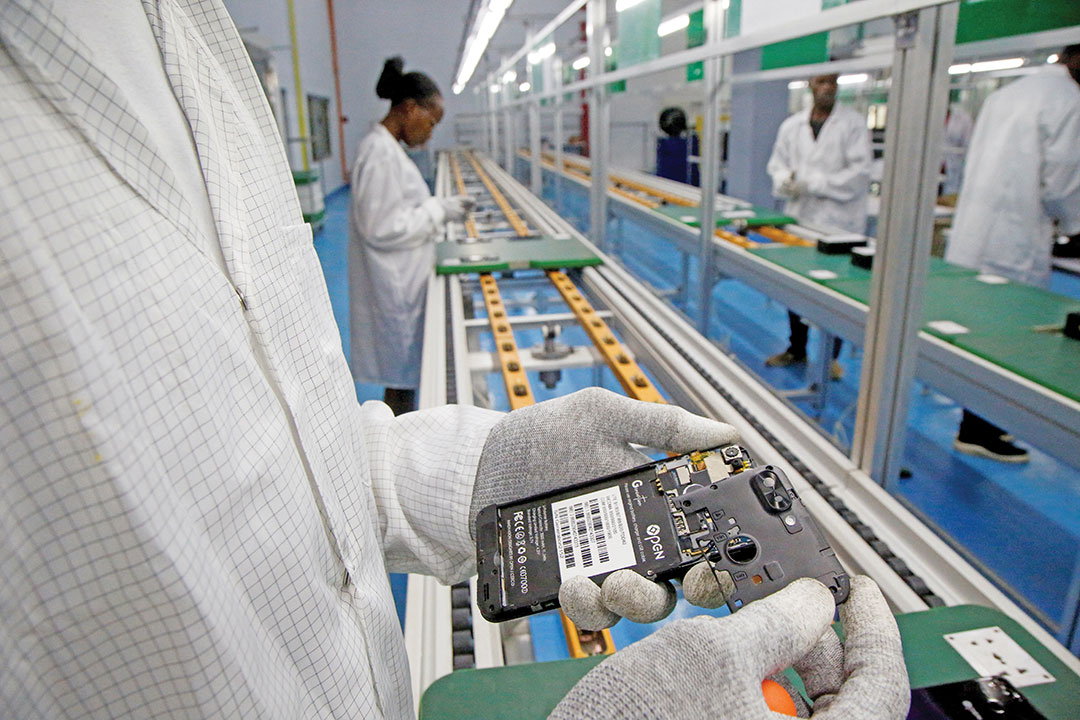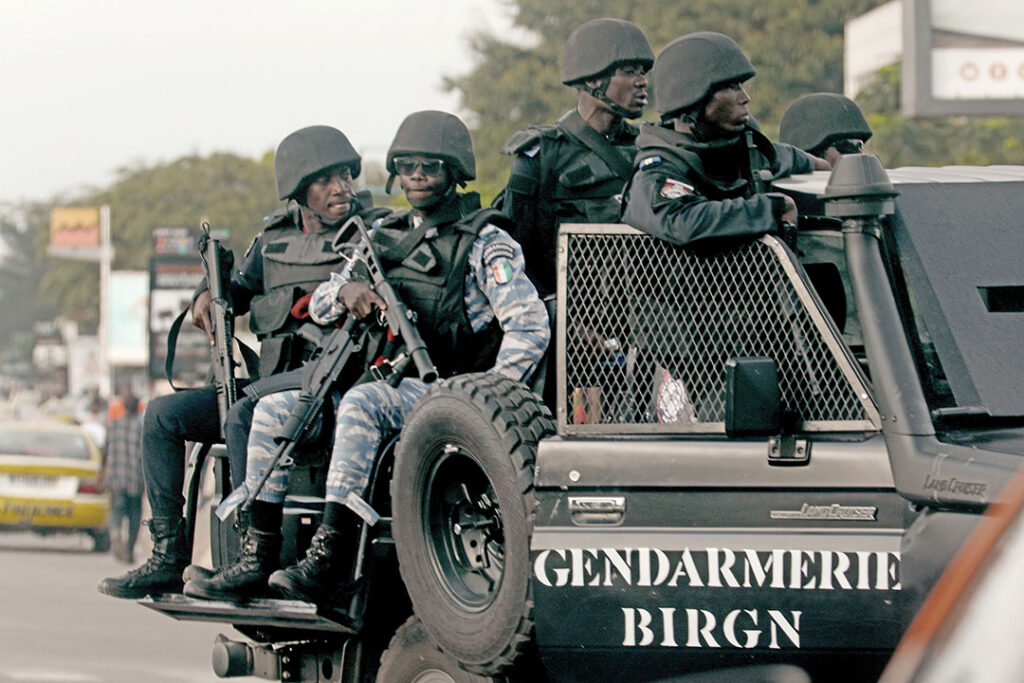ADF STAFF
Years of peace in the coastal nation of Côte d’Ivoire were interrupted in 2020 when violent extremist groups in neighboring Burkina Faso began crossing the border and staging attacks. Côte d’Ivoire reported at least 20 attacks, including assaults on military positions and convoys. The invasions were backed with propaganda campaigns and threats against civilians.
The country was prepared for the violence, researcher William Assanvo wrote in a 2023 report for the Institute for Security Studies. Côte d’Ivoire already had measures in the pipeline to address the problem. It had developed a national counterterrorism strategy in 2018, and at about the same time, established an information program to counter attempts at imposing radical religious interpretations.
Terrorists have wreaked havoc on Mali and are trying to expand across the Sahel and further south. Côte d’Ivoire, with its strong economy and its modern port in Abidjan, would be an important conquest for extremists. The main terrorist threat in Côte d’Ivoire comes from al-Qaida affiliate Jama’at Nusrat al-Islam wal-Muslimin. The group mainly operates in the Sahel, including Burkina Faso and Mali, but has extended its range across the Burkinabe border with northern and northeastern Côte d’Ivoire. The International Crisis Group (ICG) reports that as extremist groups in the Sahel move southward, Côte d’Ivoire “has beefed up its security deployment in the north and rolled out a range of social projects to alleviate poverty and youth unemployment.”
Cote d’Ivoire is small, and its economy remains largely dependent on the production of cocoa beans and palm oil. But it is otherwise a dynamo of commerce and development. The port in Abidjan is one of West Africa’s largest and most modern. The country’s telecommunications network includes the locally made Open G smartphone, which can handle 16 local languages. The country now has West Africa’s second-strongest economy, after Nigeria.

Côte d’Ivoire’s problems with terrorism mostly originate with Mali. A 2021 Chatham House report notes that Burkina Faso, Mali and Niger “have suffered from successive weak governments characterized by corruption, impunity, and disorganization.”
“In Mali, the army and allied militias committed atrocities in the central and southern regions in 2018 and 2019 but no trials of perpetrators ever took place,” the report said. “This lack of accountability and justice helped stoke hostilities between nation governments in the Sahel and their marginalized, poor, and neglected communities. Their elites have failed to provide security for vast sections of the population.”
As extremists continue to expand through northern and central Mali and into Burkina Faso, as many as 1 in 11 residents has been displaced, the ICG reports.
The government began restoring political stability through economic growth in 2011 after nearly a decade of civil conflict ended with a weakened military and infrastructure. At the same time, the ICG noted, far-reaching security-sector reforms enabled authorities “to build a military able to ward off the jihadist violence scarring the Sahel.”
Since last attacked, Côte d’Ivoire has boosted the military and security presence in the Savanes and Zanzan districts that border Mali and Burkina Faso. Côte d’Ivoire continues to work with its neighbors under the Accra Initiative to detect and disruptregional terrorism.
In 2021, Côte d’Ivoire inaugurated its International Academy to Combat Terrorism. The 1,100-hectare campus in Jacqueville sits 50 kilometers outside Abidjan and includes a school for government officials, a training center for special forces and a research institute. Ivoirian and French leaders created the counterterror training program in 2017. The facility has training modules for police, military, customs officials and prison administrators.
The opening ceremony took place three days after extremists attacked a security station in the northern city of Tougbo, killing one Ivoirian Soldier. The attack was the third in that region in two months.

Building A National Strategy
Côte d’Ivoire has become a leader in Africa in developing a national strategy to stop terrorism. Its steps have included:
A national initiative to fight money laundering and terrorism financing.
The construction of army bases and the deployment of counterterrorism units along its northern borders with Mali and Burkina Faso.
Cooperation with other nations in arresting extremists and handing them over to Mali, which has led to increased security measures and anti-terror patrols in the region.
The country continues to build and refine its measures to keep extremism at bay. In January 2022, then-Prime Minister Patrick Achi launched a special program to keep terrorists from recruiting young people from border regions. Jeune Afrique reported that the program was designed to “prevent them from rallying jihadist groups in these areas where the feeling of abandonment by the State is present.” At the end of 2022, about 23,000 young people had been integrated into the project, with a goal of 66,000 members in 2024. The program develops apprenticeships and other employment opportunities for its members.
The project is just one way Côte d’Ivoire has remained free of terrorist attacks for more than two years. The total commitment includes a combination of military intervention, enhanced security and greater investment in border areas.
“The goal is to reverse perceptions among border communities that the state has abandoned them,” Assanvo wrote. “Doing so will reduce the risk that they are exploited by insurgents.”
In 2022, Côte d’Ivoire joined with neighbors in West Africa’s Accra Initiative to create the 10,000-person Multinational Joint Task Force/Accra Initiative, modeled on a similar task force operating in the Lake Chad Basin. In addition to security, the program invests in education and health care, along with key infrastructure such as roads and drinking water. The African Development Bank provided $10.53 million in 2022 to help provide electricity to 71,600 households and more than 7,100 business centers in Côte d’Ivoire’s Savanes, Zanzan and Woroba districts. The electrification program is part of a larger effort to reduce poverty in the north and, by extension, the temptation toward radicalization.
“Depending on whether it reduces structural vulnerabilities and fragility in the country’s north, the social program could — by complementing military and security operations — reduce current and future threats,” Assanvo wrote.
Even with its successes, the country has no room for complacency. Russia’s mercenary Wagner Group, which now calls itself Africa Corps, has made no secret of its desire to expand its military influence into new parts of Africa, especially Côte d’Ivoire. Wagner already is firmly embedded in the Central African Republic, where it is part of the country’s presidential security team. Wagner also supported coups in Burkina Faso and Mali.

“Increasingly, it appears that the Wagner Group has its sights on three other West African countries: Liberia, Sierra Leone and [Côte d’Ivoire],” researcher Michael Rubin wrote for the American Enterprise Institute in early 2023. “Each has suffered past unrest. Whereas often United Nations peacekeeping missions cost billions of dollars, extend decades, and achieve only marginal results, Liberia, Sierra Leone, and [Côte d’Ivoire] … are the three countries the U.N. points to as the exception that proves the rule.”
José Naranjo, writing for El País in January 2024, noted that the country’s main challenge is to spread its newfound wealth to all its citizens.
“From 2015 to 2020, the poverty rate decreased from 46% to 39%, indicating a significant portion of the population still faces severe challenges,” he reported. “In cities like Abidjan, the high cost of living is a common complaint due to inflation hovering around 4%. The impact of Covid-19 and the Ukraine war has exacerbated inflation in recent years.” And, he noted, the government announced a 10% increase in electricity rates.
The International Crisis Group says that Côte d’Ivoire’s twin focus on security and economic development “is yielding important dividends for the population in the north.” The country should increase social investments and keep building trust between the military and civilians. Côte d’Ivoire, the group said, should continue to build its critical relationship with Burkina Faso and support multilateral intelligence-sharing initiatives. Côte d’Ivoire also should continue to build cooperative relationships with Benin, Ghana and Togo, among others.

